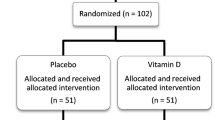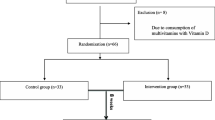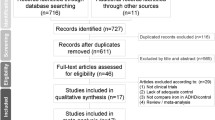Abstract
The aim of this study is to compare iron deficiency parameters in patients with stimulant-naive attention-deficit/hyperactivity disorder (ADHD) and healthy controls, to investigate whether there are differences among the ADHD presentations, and to evaluate the relationship between ADHD symptom severity and serum ferritin levels. In addition, ADHD-Predominantly Inattentive (ADHD-PI) patients with restrictive hyperactivity/impulsivity symptoms were evaluated as a separate group with “restrictive inattention presentation” (ADHD-Rest) and were compared with other groups. Patients with ADHD-Rest are typically defined as having six or more symptoms of inattention and fewer than three symptoms of hyperactivity/impulsivity. A total of 200 ADHD cases consisting of 100 ADHD-Combine (ADHD-C) and 100 ADHD-PI and a total of 100 healthy control cases were included in the study. The Schedule for Affective Disorders and Schizophrenia for School Age Children-Present and Lifetime Version was performed in a semi-structured interview during the diagnosis. The Turgay DSM-IV-Based Child and Adolescent Behavior Disorders Screening and Rating Scale, the Conners’ Rating Scale-Revised: Long Form (Parent–Teacher) (CPRSR:L, CTRS-R:L) were used for clinical evaluation. Hemogram, serum iron, iron binding capacity and serum ferritin levels were assessed. There were no significant differences between the ADHD patients and the healthy control cases in terms of iron deficiency parameters. Further, there were no significant differences among the ADHD presentations in terms of the same parameters, nor were there any significant differences when the groups were examined after the identification of the ADHD-Rest. The CPRS-R:L Hyperactivity and the CTRS-R:L Hyperactivity scores were negatively correlated with serum ferritin level in the ADHD group. To our knowledge, our current study is the first to compare serum ferritin levels in ADHD-Rest with other presentations of ADHD, and included the largest number of patients that were classified by ADHD presentations. Elucidation of these findings is important for both the etiology and treatment of ADHD.
Similar content being viewed by others
References
APA (2000) DSM IV: Diagnositic and statistical manual of mental disorders. American Psychiatric Press, Washington
Willcutt EG (2012) The prevalence of DSM-IV attention-deficit/hyperactivity disorder: a meta-analytic review. Neurotherapeutics 9:490–499
Taylor E (2011) Antecedents of ADHD: a historical account of diagnostic concepts. Atten Defic Hyperact Disord 3:69–75
Thapar A, Cooper M, Jefferies R, Stergiakouli E (2012) What causes attention deficit hyperactivity disorder? Arch Dis Child 97:260–265
Swanson JM, Kinsbourne M, Nigg J, Lanphear B, Stefanatos GA, Volkow N et al (2007) Etiologic subtypes of attention-deficit/hyperactivity disorder: brain imaging, molecular genetic and environmental factors and the dopamine hypothesis. Neuropsychol Rev 17:39–59
Cortese S, Lecendreux M, Bernardina BD, Mouren MC, Sbarbati A, Konofal E (2008) Attention-deficit/hyperactivity disorder, Tourette’s syndrome, and restless legs syndrome: the iron hypothesis. Med Hypotheses 70:1128–1132
Cortese S, Angriman M, Lecendreux M, Konofal E (2012) Iron and attention deficit/hyperactivity disorder: what is the empirical evidence so far? A systematic review of the literature. Exp Rev Neurother 12:1227–1240
Andrews NC (1999) Disorders of iron metabolism. N Engl J Med 341:1986–1995
Wigglesworth JM, Baum H (1988) Iron dependent enzymes in the brain. In: Youdim MB (ed) Brain iron: neurochemical and behavioral aspects. Taylor and Francis, New York, pp 25–66
Erikson KM, Jones BC, Beard JL (2000) Iron deficiency alters dopamine transporter functioning in rat striatum. J Nutr 130:2831–2837
Erikson KM, Jones BC, Hess EJ, Zhang Q, Beard JL (2001) Iron deficiency decreases dopamine D1 and D2 receptors in rat brain. Pharmacol Biochem Behav 69:409–418
Youdim MB, Ben-Shachar D, Yehuda S (1989) Putative biological mechanisms of the effect of iron deficiency on brain biochemistry and behavior. Am J Clin Nutr 50(Suppl 3):607–615 (discussion 615–617)
Castellanos FX (1997) Toward a pathophysiology of attention-deficit/hyperactivity disorder. Clin Pediatr (Phila) 36:381–393
Lozoff B, Beard J, Connor J, Barbara F, Georgieff M, Schallert T (2006) Long-lasting neural and behavioral effects of iron deficiency in infancy. Nutr Rev 64(5 Pt 2):S34–S43 (discussion S72–S91)
Donfrancesco R, Parisi P, Vanacore N, Martines F, Sargentini V, Cortese S (2013) Iron and ADHD: time to move beyond serum ferritin levels. J Atten Disord 17:347–357
Konofal E, Lecendreux M, Arnulf I, Mouren MC (2004) Iron deficiency in children with attention-deficit/hyperactivity disorder. Arch Pediatr Adolesc Med 158:1113–1135
Konofal E, Cortese S, Marchand M, Mouren MC, Arnulf I, Lecendreux M (2007) Impact of restless legs syndrome and iron deficiency on attention-deficit/hyperactivity disorder in children. Sleep Med 8:711–715
Juneja M, Jain R, Singh V, Mallika V (2010) Iron deficiency in Indian children with attention deficit hyperactivity disorder. Indian Pediatr 47:955–958
Calarge C, Farmer C, DiSilvestro R, Arnold LE (2010) Serum ferritin and amphetamine response in youth with attention-deficit/hyperactivity disorder. J Child Adolesc Psychopharmacol 20:495–502
Lahat E, Heyman E, Livne A, Goldman M, Berkovitch M, Zachor D (2011) Iron deficiency in children with attention deficit hyperactivity disorder. Isr Med Assoc J 13:530–533
Mahmoud MM, El-Mazary AA, Maher RM, Saber MM (2011) Zinc, ferritin, magnesium and copper in a group of Egyptian children with attention deficit hyperactivity disorder. Ital J Pediatr 37:60
Cortese S, Azoulay R, Castellanos FX (2012) Brain iron levels in attention-deficit/hyperactivity disorder: a pilot MRI study. World J Biol Psychiatry 13:223–231
Bener A, Kamal M, Bener H, Bhugra D (2014) Higher prevalence of iron deficiency as strong predictor of attention deficit hyperactivity disorder in children. Ann Med Health Sci Res 4(Suppl 3):S291–S297
Millichap JG, Yee MM, Davidson SI (2006) Serum ferritin in children with attention-deficit hyperactivity disorder. Pediatr Neurol 34:200–203
Menegassi M, Mello ED, Guimarães LR, Matte BC, Driemeier F, Pedroso GL et al (2010) Food intake and serum levels of iron in children and adolescents with attention-deficit/hyperactivity disorder. Rev Bras Psiquiatr 32:132–138
Kiddie JY, Weiss MD, Kitts DD, Levy-Milne R, Wasdell MB (2010) Nutritional status of children with attention deficit hyperactivity disorder: a pilot study. Int J Pediatr 2010:767318
Kwon HJ, Lim MH, Ha M, Kim EJ, Yoo SJ, Kim JW, Paik KC (2011) Transferrin in korean children with attention deficit hyperactivity disorder. Psychiatry Investig 8:366–371
Willcutt EG, Nigg JT, Pennington BF, Solanto MV, Rohde LA, Tannock R et al (2012) Validity of DSM-IV attention deficit/hyperactivity disorder symptom dimensions and subtypes. J Abnorm Psychol 121:991–1010
Milich R, Balentine AC, Lynam DR (2001) ADHD combined type and ADHD predominantly inattentive type are distinct and unrelated disorders. Clin Psychol Sci Pract 8:463–488
Schmitz M, Ludwig H, Rohde LA (2010) Do hyperactive symptoms matter in ADHD-I restricted phenotype? J Clin Child Adolesc Psychol 39:741–748
Pozzi M, Bertella S, Cattaneo D, Molteni M, Perrone V, Carnovale C et al (2013) Are non-serious adverse reactions to psychiatric drugs really non-serious? J Child Adolesc Psychopharmacol 23:394–400
Kaplan G, Newcorn JH (2011) Pharmacotherapy for child and adolescent attention-deficit hyperactivity disorder. Pediatr Clin N Am 58:99–120
D’Amato TJ (2005) Is iron deficiency causative of attention-deficit/hyperactivity disorder? Arch Pediatr Adolesc Med 159:788
Oner P, Oner O (2008) Relationship of ferritin to symptom ratings children with attention deficit hyperactivity disorder: effect of comorbidity. Child Psychiatry Hum Dev 39:323–330
Oner O, Alkar OY, Oner P (2008) Relation of ferritin levels with symptom ratings and cognitive performance in children with attention deficit-hyperactivity disorder. Pediatr Int 50:40–44
Cortese S, Konofal E, Bernardina BD, Mouren MC, Lecendreux M (2009) Sleep disturbances and serum ferritin levels in children with attention-deficit/hyperactivity disorder. Eur Child Adolesc Psychiatry 18:393–399
Oner O, Oner P, Bozkurt OH, Odabas E, Keser N, Karadag H, Kizilgün M (2010) Effects of zinc and ferritin levels on parent and teacher reported symptom scores in attention deficit hyperactivity disorder. Child Psychiatry Hum Dev 41:441–447
Oner P, Oner O, Azik FM, Cop E, Munir KM (2012) Ferritin and hyperactivity ratings in attention deficit hyperactivity disorder. Pediatr Int 54:688–692
Abou-Khadra MK, Amin OR, Shaker OG, Rabah TM (2013) Parent-reported sleep problems, symptom ratings, and serum ferritin levels in children with attention-deficit/hyperactivity disorder: a case control study. BMC Pediatr 13:217
Turgay A (1994) Disruptive Behavior Disorders-Child and Adolescent Screening and Rating Scales for Children, Adolescents. Integrative Therapy Institute Publication, Toronto, Parents and Teachers
Nikolas MA, Nigg JT (2013) Neuropsychological performance and attention-deficit hyperactivity disorder subtypes and symptom dimensions. Neuropsychology 27:107–120
Durak S, Ercan ES, Ardic UA, Yuce D, Ercan E, Ipci M (2014) Effect of methylphenidate on neurocognitive test battery: an evaluation according to the diagnostic and statistical manual of mental disorders, fourth edition, subtypes. J Clin Psychopharmacol 34:467–474
Leckman JF, Sholomskas D, Thompson WD, Belanger A, Weissman MM (1982) Best estimate of lifetime psychiatric diagnosis: a methodological study. Arch Gen Psychiatry 39:879–883
Kaufman J, Birmaher B, Brent D, Rao U, Flynn C, Moreci P et al (1997) Schedule for Affective Disorders and Schizophrenia for School-Age Children-Present and Lifetime Version (K-SADS-PL): initial reliability and validity data. J Am Acad Child Adolesc Psychiatry 36:980–988
Gokler B, Unal F, Pehlivanturk B, Kultur EC, Akdemir D, Taner Y (2004) Reliability and Validity of Schedule for Affective Disorders and Schizophrenia for School Age Children-Present and Lifetime Version-Turkish Version (K-SADS-PL-T). Turk J Child Adolesc Ment Health 11:109–116
Ercan ES, Amado S, Somer O, Cıkoglu S (2001) Development of a test battery for attention deficit hyperactivity and disruptive behavior disorders. J Child Adolesc Ment Health 8:132–144
Conners CK, Sitarenios G, Parker JD, Epstein JN (1998) The revised Conners’ Parent Rating Scale (CPRS-R): factor structure, reliability, and criterion validity. J Abnorm Child Psychol 26:257–268
Kaner S, Buyukozturk S, Iseri E, Ak A, Ozaydın L (2011) Conners’ parent rating scale long form-revised: factor structure, reliability and validity studies. Turk J Child Adolesc Mental Health 18:45–58
Conners CK, Sitarenios G, Parker JD, Epstein JN (1998) Revision and restandardization of the Conners Teacher Rating Scale (CTRS-R): factor structure, reliability, and criterion validity. J Abnorm Child Psychol 26:279–291
Kaner S, Buyukozturk S, Iseri E, Ak A, Ozaydin L (2006) The validity and reliability study of the Turkish version of Conners’ Teacher Rating Scale-Revised (CTRS-R). In: Proceedings World Psychiatric Association Congress, Istanbul, Turkey
Savasir I, Sahin N (1995) Wechsler Çocuklar İçin Zeka Ölçeği (WISC-R). Turkish Psychological Association, Ankara
Gottfried RJ, Gerring JP, Machell K, Yenokyan G, Riddle MA (2013) The iron status of children and youth in a community mental health clinic is lower than that of a national sample. J Child Adolesc Psychopharmacol 23:91–100
Chen MH, Su TP, Chen YS, Hsu JW, Huang KL, Chang WH et al (2013) Association between psychiatric disorders and iron deficiency anemia among children and adolescents: a nationwide population-based study. BMC Psychiatry 13:161
Gillum RF (2001) Association of serum ferritin and indices of body fat distribution and obesity in Mexican American men—the Third National Health and Nutrition Examination Survey. Int J Obes Relat Metab Disord 25:639–645
Iwasaki T, Nakajima A, Yoneda M, Yamada Y, Mukasa K, Fujita K et al (2005) Serum ferritin is associated with visceral fat area and subcutaneous fat area. Diab Care 28:2486–2491
Jeon YJ, Jung IA, Kim SH, Cho WK, Jeong SH, Cho KS et al (2013) Serum ferritin level is higher in male adolescents with obesity: results from the Korean National Health and Nutrition Examination Survey 2010. Ann Pediatr Endocrinol Metab 18:141–147
Doom JR, Georgieff MK, Gunnar MR (2015) Institutional care and iron deficiency increase ADHD symptomology and lower IQ 2.5–5 years post-adoption. Dev Sci 18:484–494
Conflict of interest
On behalf of all authors, the corresponding author states that there is no conflict of interest.
Author information
Authors and Affiliations
Corresponding author
Rights and permissions
About this article
Cite this article
Percinel, I., Yazici, K.U. & Ustundag, B. Iron Deficiency Parameters in Children and Adolescents with Attention-Deficit/Hyperactivity Disorder. Child Psychiatry Hum Dev 47, 259–269 (2016). https://doi.org/10.1007/s10578-015-0562-y
Published:
Issue Date:
DOI: https://doi.org/10.1007/s10578-015-0562-y




